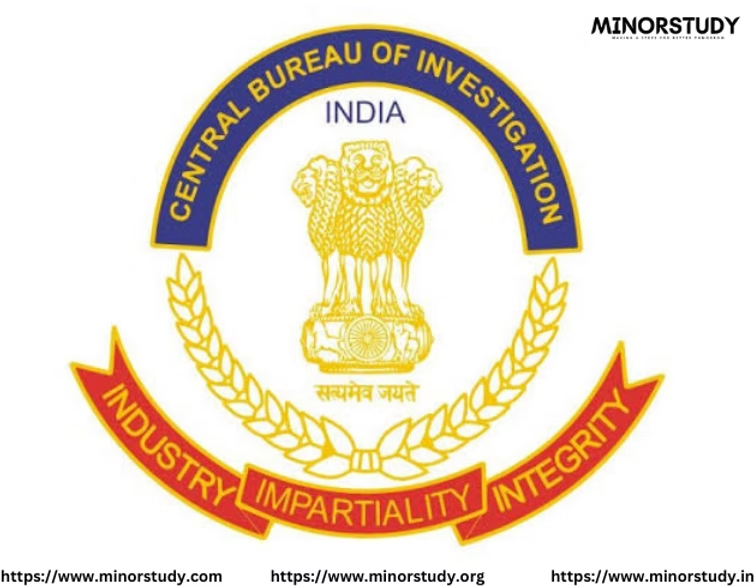The Central Bureau of Investigation (CBI) is India’s premier investigative agency, responsible for addressing complex criminal cases, corruption, and significant violations of national laws. It is often referred to as the “Indian FBI”, though its functions encompass a broader spectrum. The CBI is known for its professionalism, impartiality, and handling of high-profile cases.
Overview
Established: 1941 as the Special Police Establishment (SPE); renamed CBI in 1963.
Headquarters: New Delhi, India.
Parent Organization: Operates under the Ministry of Personnel, Public Grievances and Pensions, but is autonomous in operations.
Motto: Industry, Impartiality, Integrity.
Key Responsibilities
Anti-Corruption Investigations:
Probes corruption and fraud in central government departments, public sector enterprises, and financial institutions.
Special Crimes Investigations:
Handles serious crimes like murder, terrorism, kidnapping, organized crime, and trafficking, particularly if they have inter-state or international implications.
Economic Offenses:
Investigates financial crimes, including bank frauds, embezzlement, and securities fraud.
Cybercrimes:
Focuses on digital fraud, hacking, and cyber terrorism.
Inter-State and International Cooperation:
Acts as the Interpol National Central Bureau (NCB) for India, liaising with global law enforcement for international crimes.
Judicial Directives:
Investigates cases referred by higher courts or state governments, often in instances of public distrust in local law enforcement.
Structure
The CBI is organized into several divisions to focus on different types of investigations:
Anti-Corruption Division: Deals with corruption and abuse of power by public officials.
Special Crimes Division: Investigates high-profile criminal cases, including murder and terrorism.
Economic Offenses Division: Focuses on financial fraud, tax evasion, and white-collar crimes.
Directorate of Prosecution: Handles legal proceedings and coordination with courts.
Policy and Coordination Division: Works on policymaking, internal discipline, and coordination with other agencies.
Forensic Services Division: Provides scientific support to investigations, including forensic analysis.
Key Powers and Jurisdiction
The CBI derives its powers from the Delhi Special Police Establishment Act, 1946.
It can investigate offenses within India and abroad with government approval.
Its jurisdiction typically extends to cases involving:
Central government employees or public institutions.
High-value frauds and scams.
State-referred or court-mandated cases.
Major Cases Handled by the CBI
Bofors Scandal (1980s):Investigated allegations of kickbacks in a defense deal with Sweden.
2G Spectrum Case (2011):Probed irregularities in telecom spectrum allocation, leading to significant political fallout.
Satyam Scam (2009):Exposed financial fraud in the IT sector involving inflated company profits.
Sheena Bora Murder Case:Investigated a sensational murder that attracted massive media attention.
Vyapam Scam:Investigated fraudulent practices in Madhya Pradesh’s recruitment and admission system.
Challenges Faced by the CBI
Political Interference:
Often criticized for alleged misuse by ruling governments for political vendettas.
Limited Autonomy:
Though independent in operations, its financial and administrative control rests with the central government.
Jurisdictional Constraints:
Requires state government consent to investigate cases within a state unless directed by the Supreme Court or High Courts.
Resource and Manpower Shortage:
Lacks sufficient personnel and technological upgrades to handle the increasing complexity of cases.
Reputation and Credibility
The CBI is often perceived as a trusted investigative agency, especially when local police forces fail or are accused of bias. However, controversies around political misuse and selective investigations have raised concerns about its impartiality.
Significance
Corruption Control: Plays a critical role in uncovering and addressing corruption in public offices.
Judicial Assistance: Provides unbiased investigations in cases where the judiciary steps in to ensure justice.
Public Trust: Acts as a symbol of integrity and professionalism in Indian law enforcement.
International Cooperation: Facilitates India’s collaboration with global law enforcement agencies through its role as the Interpol NCB.
Recent Developments
Enhanced focus on cybercrime and digital fraud investigations.
Strengthened collaboration with international agencies to combat cross-border crimes.
Introduction of modern forensic and AI-based tools for faster and more reliable investigations.
Central Bureau of Investigation: The CBI remains a cornerstone of India’s law enforcement framework, symbolizing a commitment to justice, accountability, and transparency in governance.








